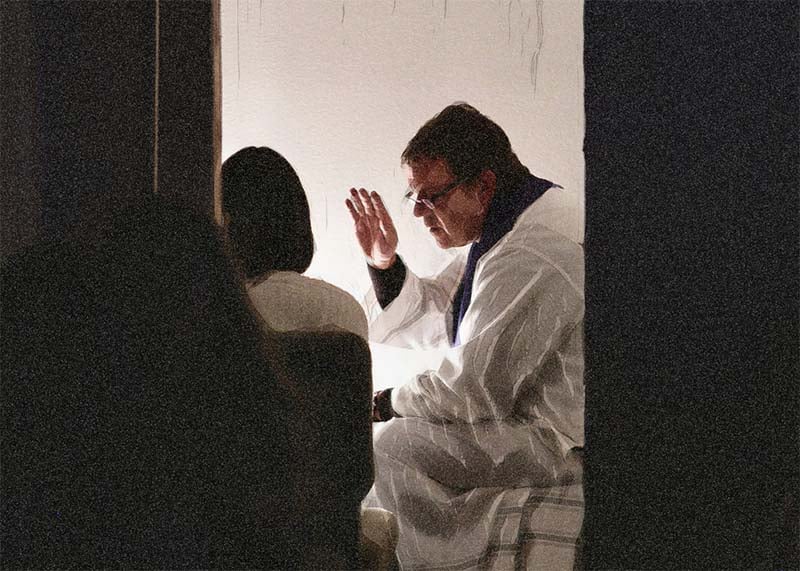
Confessions without consequences
”The priest asked me upstairs. (...) He said that I'm special,” says a Polish survivor in the documentary ”Tell No One”. Her priest would kiss her and masturbate using her hands. She was seven years old.
She is one of at least half a million survivors of sexual abuse in the Catholic Church in Western Europe, the large majority being children. In France alone, 333,000 children have been abused by priests since 1950. Large-scale studies lack in other countries, but between 2 and 4% of Catholic priests have sexually abused children, often escaping criminal charges.
Despite decades of evidence, the institution still escapes accountability. Asked how long real accountability might take, Polish activist Paulina Model gave a bleak answer: ”Some forty years. It's the so-called geriatric scenario; the most-opposed bishops will just die out.”
The extent of the abuse has many explanations: priests rendered sexually immature due to a vow of celibacy taken when they were young; the treatment of child abuse as a purely psychological issue rather than a crime; or even a pervasive culture of secrecy which provided a sense of immunity.
Barriers to justice?
Because many cases happened decades ago, victims often face legal time limits that prevent them from taking their abusers to court. Poland removed these limits for the most severe cases of child sexual abuse after the documentary. In many cases, however, the perpetrators may have passed away, leaving survivors with no legal path to justice.
Then comes the Church's unwillingness to collaborate. In Ireland, a 2009 commission report found that child abuse in Catholic child institutions was endemic – but criminal prosecutions were made impossible as the Church sued the commission to keep its members anonymous. A more recent scoping inquiry into abuse in schools found that religious orders would only join further investigations if identities were protected or witnesses granted immunity.
The heart of Catholicism
Italy, the heart of Catholicism, has made little progress in confronting clerical abuse. There has never been a nationwide, state-led inquiry into sexual abuse within the Church, and unlike France or Ireland, the push for transparency has been led almost entirely by survivors and advocacy groups.
Internal reports remain limited in scope, time frame, and independence; a 2022 report only examined complaints made directly to dioceses (local districts of the Catholic Church) between 2020 and 2021, excluding decades of historical abuse.
This reluctance to hold perpetrators accountable is the product of the enduring influence of the Catholic Church. Politicians are often wary of alienating the Church, which continues to wield significant soft power, from education to healthcare.
The Vatican's legal shield
The Vatican's proximity, both geographical and legal, adds to the challenge. Italian prosecutors cannot automatically access internal Church documents or disciplinary records from the Holy See as it is a sovereign state, which also grants it full diplomatic immunity and legal autonomy.
As a result, abuse cases are often handled through canon law, the internal legal system of the Catholic Church, with few priests ever facing criminal charges. Perpetrators are sometimes quietly reassigned rather than handed over to civil authorities, protecting the institution at the expense of the victims.
The cost of inaction
Real justice for survivors goes beyond pushing individual abusers; the institutional failures allowing abuse to persist must be addressed. The cost of inaction is profound. Survivors are retraumatised by silence, denial, and ongoing obstruction, perpetuating harm across generations.
The Irish government's recent inquiry into historical sexual abuse in schools run by religious orders highlights key elements for meaningful justice: transparency, survivor-centred investigations, and comprehensive support services. Survivors demand open access to records, legal recognition of institutional responsibility, and reparations.
The inquiry demands independent investigations free from Church control and timely compensation schemes. Justice also means ending the culture of silence and denial, ensuring survivors are heard, believed, and supported throughout the process.
Can it be done differently?
France offers a promising counter-model. In 2021, a report estimated that over 330,000 children had been abused in the Catholic Church since 1950. A commission was created to mediate between victims and religious institutions to negotiate reparations. Over 1,100 people have since reached out to it.
This model prioritises victim-centred justice: it can provide a swift answer for those who may not want to go to trial, or a consolation for those who can't prosecute due to the statute of limitation: 87% of victims who get in touch with the commission were abused between 1950 and 1980.
The legal responsibility of religious orders and institutions remains largely untouched, while they continue to run schools. In France, one of three accused of sexual violence in a landmark case of abuse in a Catholic school was still working there last year.